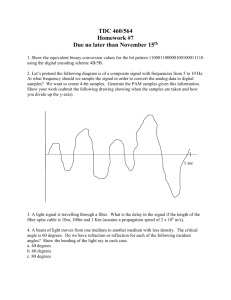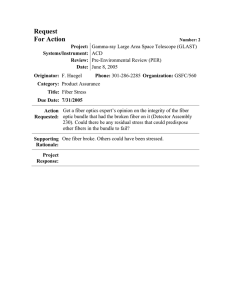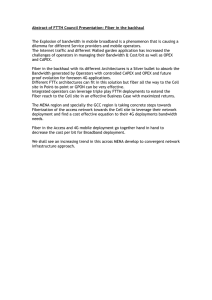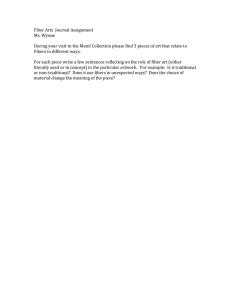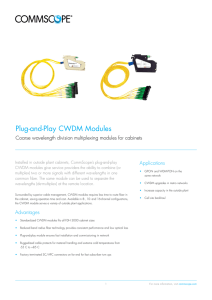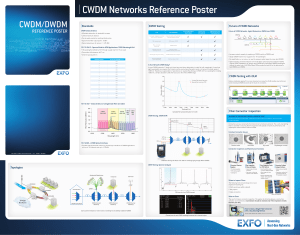Relieve Fiber Exhaustion
advertisement
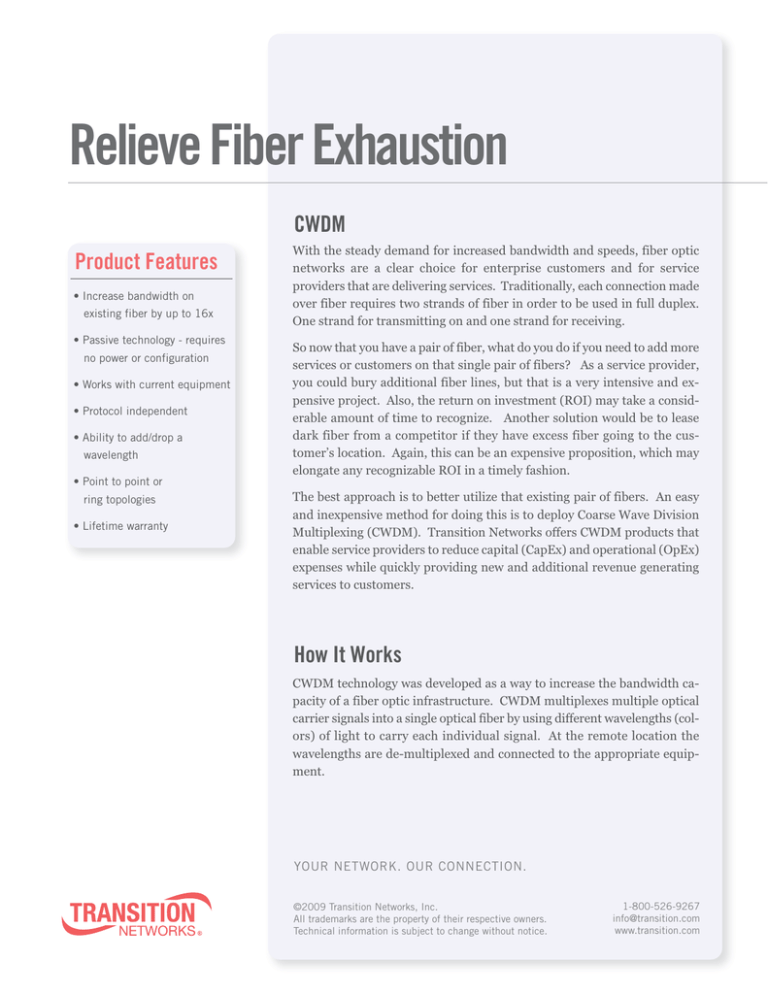
Relieve Fiber Exhaustion CWDM Product Features • Increase bandwidth on existing fiber by up to 16x • Passive technology - requires no power or configuration • Works with current equipment • Protocol independent • Ability to add/drop a wavelength With the steady demand for increased bandwidth and speeds, fiber optic networks are a clear choice for enterprise customers and for service providers that are delivering services. Traditionally, each connection made over fiber requires two strands of fiber in order to be used in full duplex. One strand for transmitting on and one strand for receiving. So now that you have a pair of fiber, what do you do if you need to add more services or customers on that single pair of fibers? As a service provider, you could bury additional fiber lines, but that is a very intensive and expensive project. Also, the return on investment (ROI) may take a considerable amount of time to recognize. Another solution would be to lease dark fiber from a competitor if they have excess fiber going to the customer’s location. Again, this can be an expensive proposition, which may elongate any recognizable ROI in a timely fashion. • Point to point or ring topologies • Lifetime warranty The best approach is to better utilize that existing pair of fibers. An easy and inexpensive method for doing this is to deploy Coarse Wave Division Multiplexing (CWDM). Transition Networks offers CWDM products that enable service providers to reduce capital (CapEx) and operational (OpEx) expenses while quickly providing new and additional revenue generating services to customers. How It Works CWDM technology was developed as a way to increase the bandwidth capacity of a fiber optic infrastructure. CWDM multiplexes multiple optical carrier signals into a single optical fiber by using different wavelengths (colors) of light to carry each individual signal. At the remote location the wavelengths are de-multiplexed and connected to the appropriate equipment. YOUR NETWORK. OUR CONNECTION. ©2009 Transition Networks, Inc. All trademarks are the property of their respective owners. Technical information is subject to change without notice. 1-800-526-9267 info@transition.com www.transition.com Relieve Fiber Exhaustion Product Benefits CWDM systems use filters to provide 20nm spacing for up to 16 separate wavelengths (colors) to be transmitted over a pair of fibers. Figure 1 shows an example of the wavelength spacing on an eight-channel CWDM module. Figure 1 CWDM solutions from Transition Networks dramatically reduce CapEx and OpEx because the CWDM equipment is passive, which means there is no configuration or power required for the solution to work. With a passive solution, there is minimal training required for the technicians to install the equipment, allowing you to reduce your OpEx while being able to quickly generate new revenue on existing fiber infrastructure. While CWDM technology provides the flexibility to increase capacity of existing fiber infrastructure, it also allows network planners and engineers to mix and match speeds (100Mbps and 1000Mbps) and protocols (Fast Ethernet, Gigabit Ethernet, T1, ATM, etc.) since each wavelength carries data independently from the other wavelengths. Figure 2 shows an example of multiple protocols being used with CWDM. Figure 2 Most customers will use small form-factor pluggable (SFP) optical transceivers that are based on the appropriate wavelength. However many products from Transition Networks are able to have fixed CWDM optics installed on them to provide the required wavelength. For service providers that have existing copper equipment, they can use optical line converters to change the signal from electrical to optical and use the appropriate wavelength. YOUR NETWORK. OUR CONNECTION. ©2009 Transition Networks, Inc. All trademarks are the property of their respective owners. Technical information is subject to change without notice. 1-800-526-9267 info@transition.com www.transition.com Relieve Fiber Exhaustion Featured Products CWDM Figure 3 is an example where we are using an existing copper switch at the Central Office or Point-of-Presence (POP) and then converting the electrical signal to the appropriate optical wavelength. The signals are then multiplexed together and sent across the fiber infrastructure. At the remote side the signals are de-multiplexed and sent to the customer location. Figure 3 Summary CWDM from Transition Networks offers many benefits to service providers that need to better utilize the existing fiber infrastructure. While providing a passive solution that reduces CapEx and OpEx, CWDM offers an easy way of providing additional services and bandwidth to customers that require it, so you can quickly recognize those additional revenue streams. Transition Networks CWDM products come with our industry standard lifetime warranty so service providers can rest at night knowing that they have the best equipment in their network. YOUR NETWORK. OUR CONNECTION. ©2009 Transition Networks, Inc. All trademarks are the property of their respective owners. Technical information is subject to change without notice. 1-800-526-9267 info@transition.com www.transition.com
